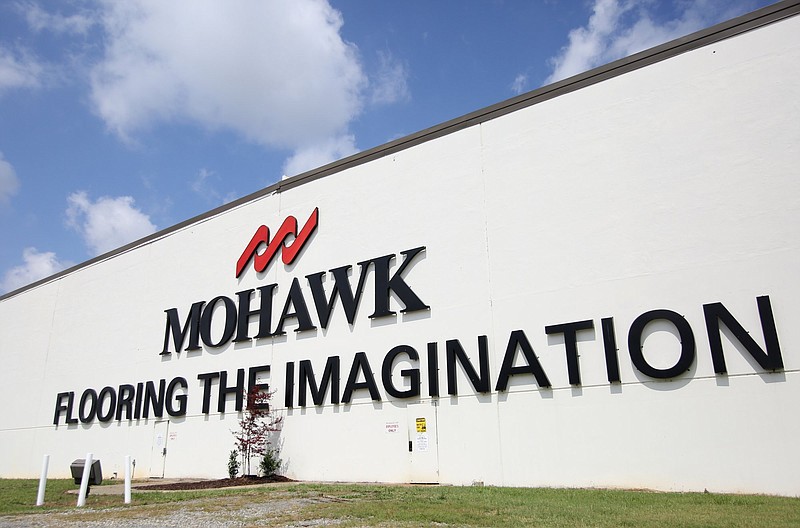The world's biggest floor covering manufacturer is staying in Russia while most other U.S. companies are leaving in protest of the Russian invasion of Ukraine.
But Mohawk Industries, the world's biggest floor covering firm with an estimated $400 million in Russian sales last year, said it has suspended new investments in Russia and suspended operations in Ukraine, the company said in an earlier statement.
The Chief Executive Leadership Council, a Yale School of Management group urging U.S. businesses to quit doing business in Russia, gave Mohawk a letter grade "D" on Wednesday for "buying time" on pulling out of Russia. Mohawk is among 56 U.S. companies holding off new investments in Russia but are not pulling out or cutting operations in Russia as 369 other U.S. companies have already done, according to the Yale University study.
The Yale study identified 37 U.S. companies that are "digging in" and defying demands for any reduction in Russian investment. The Chief Executive Leadership Council gave a failing grade to those companies.
JPMorgan Chase's macro research team identified Mohawk as one of the stock-traded companies facing negative effects from the war in Ukraine, with 4.3% of Mohawk's sales coming from Russia and Ukraine.
Mohawk acquired the No. 1 ceramic tile manufacturer in Russia through its $1.5 billion purchase of the Marazzi Group in 2013. The purchase made Mohawk the worldwide leader in ceramic tile.
"We found Marrazi attractive because of its solid management team and leadership positions in the U.S., Russia and Europe," Mohawk CEO Jeff Lorberbaum said at the time of the Marrazi purchase.
Lorberbaum, who lives in Chattanooga, has headed the Calhoun, Georgia-based Mohawk Industries since 2001.
In a statement to its employees March 11, Mohawk said it is working to support relief efforts in Ukraine and neighboring countries and urged workers to join in the assistance efforts by UNICEF and other relief agencies.
"We have been concerned and saddened at the humanitarian crisis involving the Ukrainian people," Mohawk said in a a statement. "Our European team has made every effort to secure and support our Ukrainian employees."
In Russia, Mohawk has continued its existing operations, but it is not investing more in the country, and it is evaluating its options for the future.
"At this point, as our hopes for near-term peace have diminished, we are taking actions within the business," Mohawk said in its statement earlier this month. "In Russia, we have suspended new investments, advertising, promotions and other activities. We are respecting all applicable sanctions and continuing to assess the situation."
Mohawk said it is providing humanitarian aid during the ongoing war and is seeking to help its Russian workforce.
"In Russia, our colleagues go to work each day focused on providing for their families," Mohawk said. "Some have been with the company for more than 20 years. As we evaluate what measures may be required, we also have to keep their well-being in mind."
Jeffrey Sonnenfeld, who heads the nonprofit Chief Executive Leadership Institute, put together the list of companies with Russian operations and urged businesses to scale back or leave Russia to put more pressure on Russian President Vladimir Putin to give up his attempt to take over Ukraine.
"Despite the cost of abandoning major investments and the loss of business, there is a strong reputational incentive to withdraw [from Russia]," Sonnenfeld wrote in a Fortune opinion article. "Companies that fail to withdraw face a wave of U.S. public resentment far greater than what they face on climate change, voting rights, gun safety, immigration reform or border security."
A recent Morning Consult survey reveals more than 75% of Americans want corporations to cut business ties with Russia after the invasion of Ukraine.
Under consumer pressure and threats of boycotts in some instances, Coca-Cola, McDonald's, Starbucks and American, United and Delta airlines are among the U.S. companies that have made what Sonnenfeld called "a clean break" with Russia and withdrawn completely from doing business in the former Soviet Union.
But leaving Russia may make it difficult to return, and shutting down plants, warehouses and supply chains can be complicated and costly.
Some executives contend that it's not up to private businesses to try to resolve global conflicts, and pulling out of Russia will hurt both business and employees in those countries.
"I don't think businesses are supposed to decide how global trade works in the world," Goldman Sachs CEO David Solomon told Time magazine. "Government sets policy and then businesses follow that policy."
Solomon's comments came despite Goldman Sachs having scaled back its own operations in Russia.
Since Russia invaded Ukraine on Feb. 24, shares of Mohawk have declined 5.6%, while the overall S&P 500 had edged up 0.9%.
Contact Dave Flessner at dflessner@timesfreepress.com or at 423-757-6340.
